Georgia Farmers Under Climate Stress
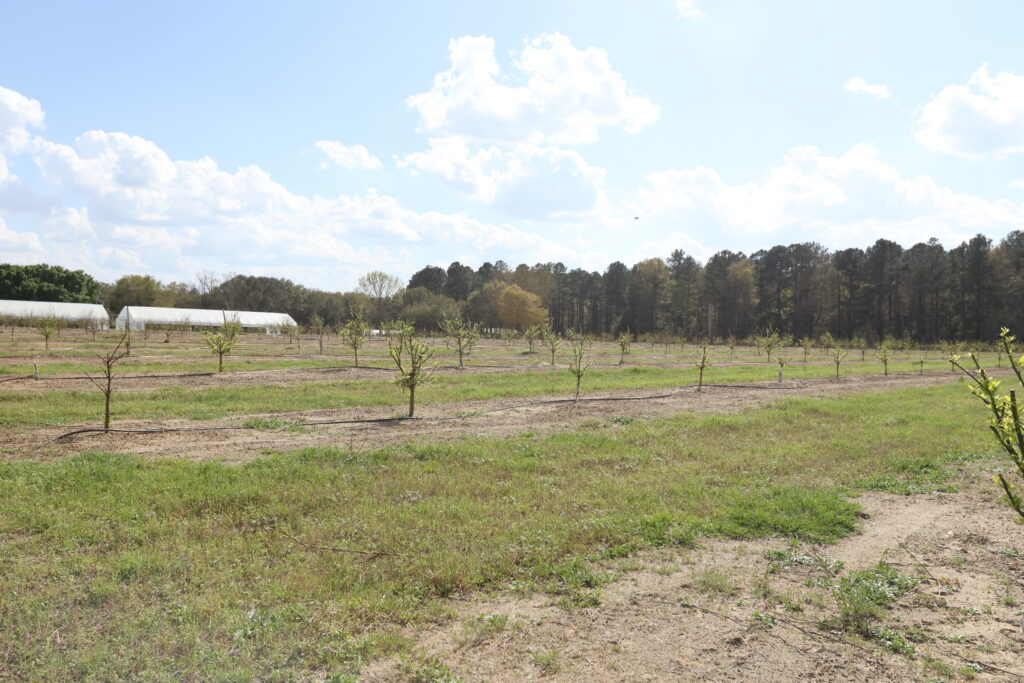
Melanie Velasquez
Georgia farmers who are planting blueberries and citrus farmers face an elevated risk of major crop loss. Climate change has forced farmers to adapt and adopt new tactics, some of which still do not protect from major crop losses.
The stress of climate change has even become a mental health concern, for Georgia farmers, according to a recent survey by Georgia Rural Health Innovation Center, Georgia Foundation for Agriculture and Mercer University School of Medicine, 29% of farmers report thinking of dying by suicide at least once per month, with 42% of all farmers thinking completing and contemplating suicide at least once in the past 12 months.
The most common stressor, researchers found, is weather and its effects. A national survey found that depression among farmers was exacerbated by concern over weather patterns that created an ultimatum.
Georgia’s agriculture makes a substantial contribution to the economy of Georgia. According to the UGA Center for Agribusiness & Economic Development, Agriculture contributes approximately $69.4 billion annually to Georgia’s economy. Climate change in Georgia has become an expensive concern that has caused farmers to lose crops and purchase more or new equipment to compensate.
Georgia has been a hub of agricultural ventures since the colony began in 1733. In the 18th century, the state of Georgia’s main commodities were cotton and tobacco. Fast forward to the 21st century and the main commodities are broilers and cotton which make up 30.1% of the agribusiness bringing in approximately 3.7 billion dollars in revenue.
In Georgia, there are 9.9 million acres of farmland. According to the New Georgia Encyclopedia, in 2019, Georgia had nearly 42,000 individual farms with more than $9.5 billion worth of agricultural products being sold.
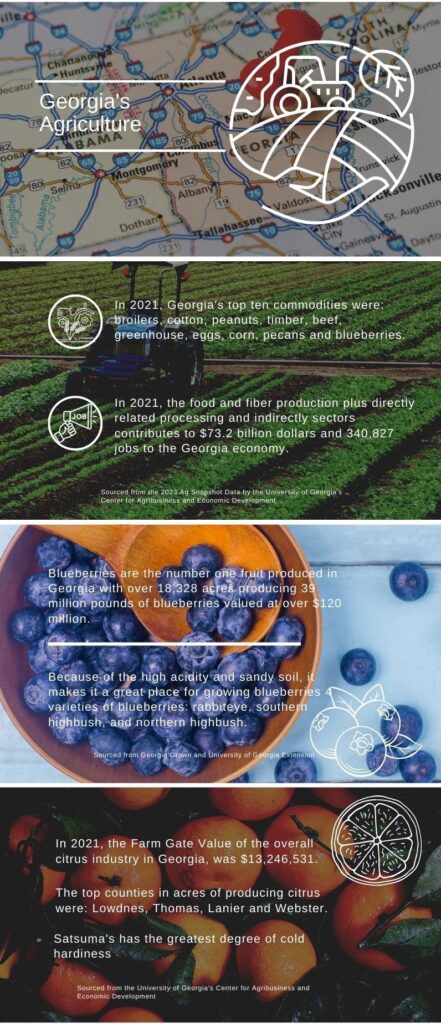
The Blueberry Problem
Climate change has especially been hard on blueberries farmers, which only made a major appearance as a top ten commodity in Georgia in 2014.
Pam Knox, Senior Public Service Associate, and director of the UGA Weather Network and agricultural climatologist, explains, “One of the problems that we have seen is that as the winters have gotten warmer the plants don’t get enough chill hours. The blueberry plants, peaches and other fruit bearing plants require a certain amount of cold weather”.
With fewer chill hours, the blooms do not appear at all or at unpredictable times which makes it difficult for farmers to get crops in when they are getting ripe at different times, turning a harvesting into a game of Russian Roulette.
In Alma, Georgia, Georgia’s blueberry capital, blueberry farmers like Brandon Wade, a third generation blueberry farmer, have seen the fluctuations in temperatures as well as how it has taken a toll on blueberry crops. Wade was born and raised in Alma, growing up on a family blueberry farm that has grown tremendously since the early 1980s.
However, climate change affected several years of crops, which forced Wade and his family to consider what they could do to prevent this.
“It is hot on our minds. How can we continue to adapt if things are going to change?”, said Wade.
Wade described how now they are getting more varieties of blueberries that push the season earlier. This is good for the price of the blueberries, but it becomes a gamble since it puts them at risk of freezes that could potentially wipe the crop.
“We didn’t use to have blueberries that ripened right now, as we do now. We used to only have those later rabbiteye varieties,” said Wade.
Alma’s annual Georgia Blueberry Festival may have to be moved, according to Wade. This is because blueberries may not even be in season by June in the future, for it does not fit the blueberry festival purpose if there are no blueberries around.
Zilfina Ames studies the life cycle of blueberries at University of Georgia Horticulture Department. Warmer temperatures, according to Ames, affect the phenology, or the life cycle, of the blueberry plant. The blueberry plants are blooming earlier exposing them to cold snaps which causes massive crop failures.
“There is not a type of blueberry that can withstand freezing temperatures because when a plant breaks dormancy it loses cold hardiness, so they are always going to be exposed to damage,” said Ames.
There are only a few ways Ames said that in Georgia, blueberry farmers are trying to prevent major crop loss. In setting up overhead irrigation, the process protects the plants, maintaining a high enough temperature so that it does not take frost damage. However, how effective this is, depends on the wind and rain conditions. It is expensive and requires a lot of resources, said Ames.
The Citrus Problem

Wilted and dead citrus fruit from the great loss Joe Franklin experienced in Fall 2022. Unexpected cold snaps lead to the loss of buds for citrus plants as well as other plants across the southernmost part of Georgia. The photograph was taken Monday, March 6, 2023, in Statesboro, Georgia. (Photo/Melanie Velasquez; melanie.velasquez0108@gmail.com)
The sweet citrus scent wafts around the golf cart as Joe Franklin, Founder and CEO of Franklin’s Citrus Farm in Statesboro, Georgia, drives around his farm showing some of the shriveled Satsuma’s crops he has lost as well as the ones he placed in special greenhouses to protect them from freeze events.
Joe Franklin drives in a golf cart around his acres of crops to show the variety he farms as well as some of the crops he lost during Fall 2022. The photograph was taken Monday, March 6, 2023, in Statesboro, Georgia. (Photo/Melanie Velasquez; melanie.velasquez0108@gmail.com)
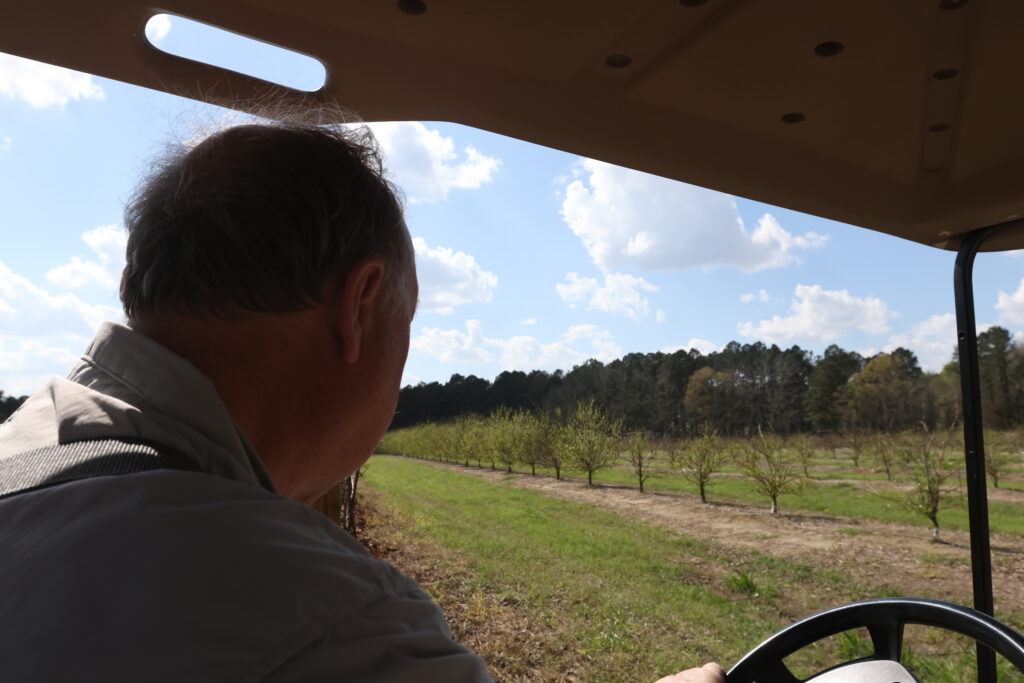
Farmers like Franklin work around the warmer weather by planting citrus species, that normally grow in Florida, that can resist the colder, Georgia temperatures. Franklin discovered Satsuma Oranges after a fishing trip in Louisiana in 2009. In the spring of 2010, he planted 200 trees and now in 2023, he has 11,000 trees covering 78 acres.
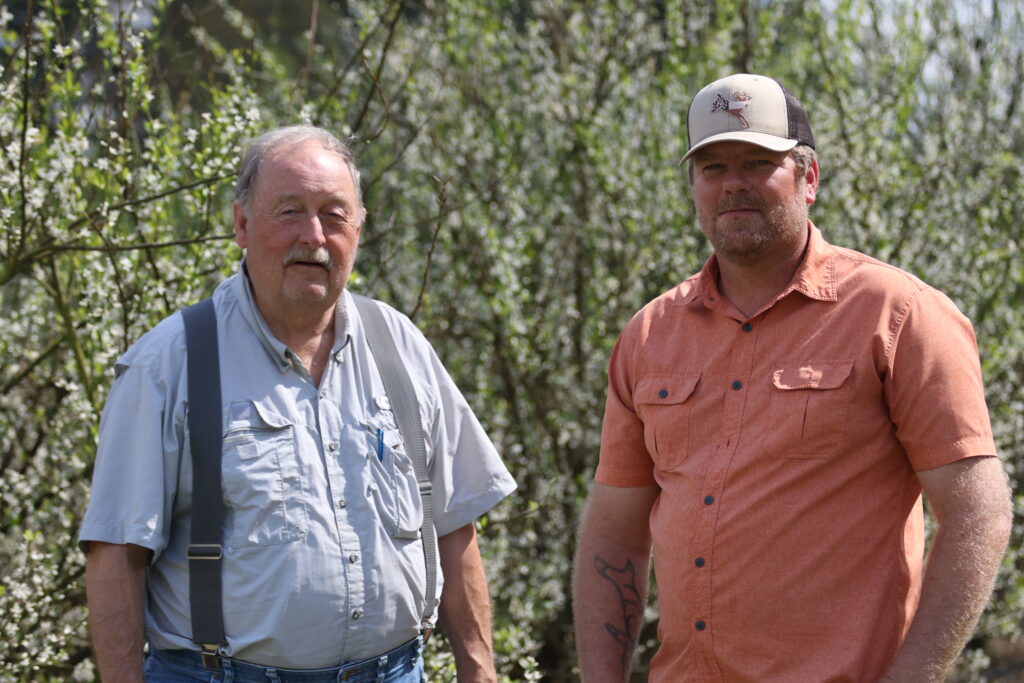
Joe Franklin (left), founder and CEO of Franklins Citrus Farm, and Bill Renz (right), sales and marketing manager, stand in front of a few acres of the citrus farm on Monday, March 6, 2023, in Statesboro, Georgia. Franklins farm was started after Franklin retired as a restaurant owner and took a fishing trip in Louisiana where he discovered the tasty Satsumas after it was being sold out of a truck and began researching how to grow them back in Bulloch County given the similar climate. He started with 200 trees in 2010 and now has over 11,000 trees as of 2022. Franklin expressed how he doesn’t agree with the concept of climate change but said he has felt the effects of growing temperatures especially in the winters with tremendous loss over the past two years with a few of his crops being wiped out. Despite this, the warmer weather has benefited him greatly with the attempts in trying to farm other varieties of citrus besides Satsumas, like lemons, grapefruits and more. (Photo/Melanie Velasquez; melanie.velasquez0108@gmail.com)
However, that has not stopped him from experiencing profit loss because of climate change, for the warmer temperatures accompanied with cold snaps kills the buds. In March 2022, Franklin recalls the freeze that got down to 19℉.
“It is nothing that a Satsuma can’t handle, but it came after three warm weeks in February, and it had already bloomed out. Of course, that 19℉ pretty much wiped out the bloom and we only had very little fruit to harvest in the fall of 2022”, said Franklin.
In addition to that loss, in December of 2022 during the several days temperatures at 15℉, Franklin’s other citrus crops such as lemons, navel oranges, tangos and gold nuggets had major losses. Any 1- or 2-year-old trees he had in the ground were also lost. Franklin said it will not be until 2024 till they bloom so he will ultimately not have a crop this year.
Wilted and dead citrus fruits from the great loss Joe Franklin experienced in Fall 2022. Unexpected cold snaps lead to the loss of buds for citrus plants as well as other plants across the southernmost part of Georgia. The photograph was taken Monday, March 6, 2023, in Statesboro, Georgia. (Photo/Melanie Velasquez; melanie.velasquez0108@gmail.com)
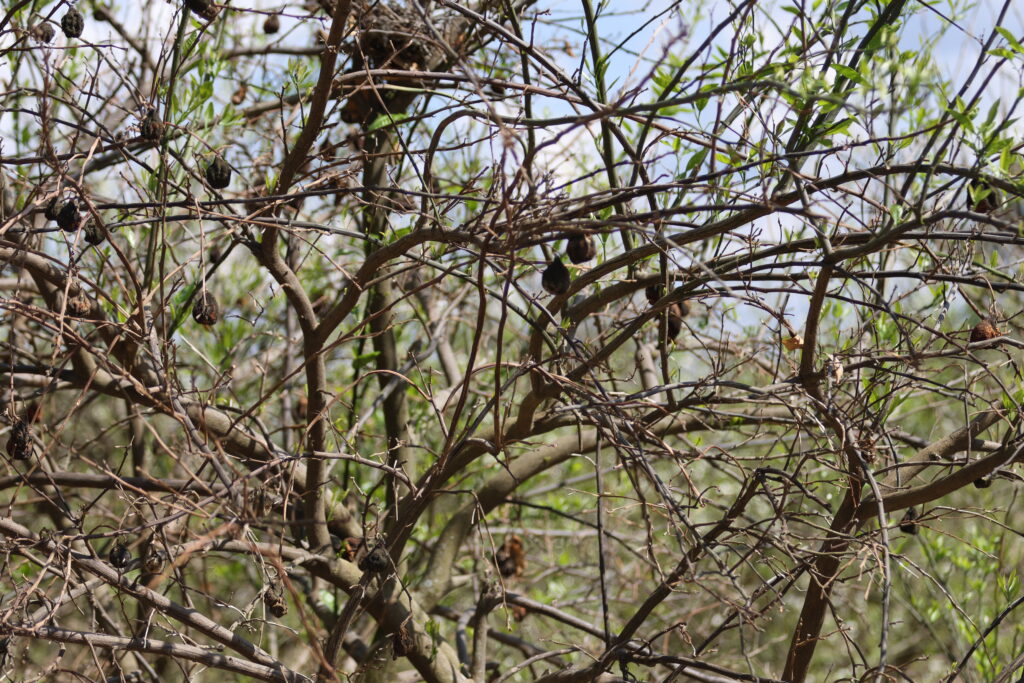
Farmers like Franklin are struggling with recovering the profit loss when warmer temperatures are causing early blooms that can not withstand cold snaps.
“I have 3,000 trees that I have to replace, and it should be covered by a disaster bill you know, but it’s not basically”, said Franklin.
After turning them in as a loss to the farmers agency and qualifying and replanting, farmers get money back for the profit loss; for Franklin it is $7 dollars a tree. However, this is half the cost of the tree which does not include the labor to replant and take care of it, said Franklin.
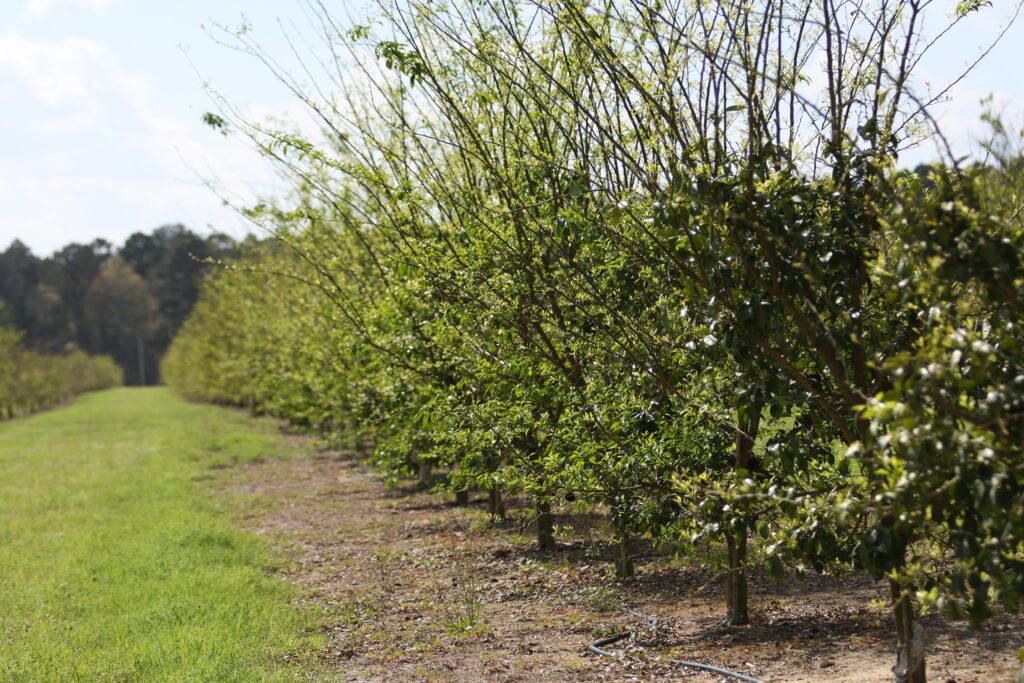
A row of Satsuma oranges are grown alongside rows of lemons and grapefruits. Joe Franklin said he grows 4 acres of strawberries as well as beginning to grow blackberries, persimmons and blueberries. Franklin said he does mail orders for the most part but will begin opening the farm up for “pick your own”. Having only citrus causes off seasons for the farms which leads to no profit, therefore Franklin decided to expand his crop lineup. The photograph was taken Monday, March 6, 2023, in Statesboro, Georgia. (Photo/Melanie Velasquez; melanie.velasquez0108@gmail.com)
The Georgia General Assembly has voted on the Agricultural Commodity Commission for Citrus Fruits bill, which will establish on July 1, 2023, the Agricultural Commodity Commission for Citrus Fruits. Governor Kemp has signed the bill, so that it may be enacted to better help citrus farmers.
In Article 3 of the ‘Georgia Farmland Conservation Act’; historic preservation, the Georgia General Assembly declared that they will create the Georgia Farmland and Conservation Fund Program to better assist farmers in protecting their farmland and to increase the supply of locally grown fruit in the state of Georgia. The fund program has been signed by Governor Kemp as of April 18, 2023.
In addition, County extension coordinator for Lowndes County, Jacob Price, said the tropical insect, the Asian Citrus Psyllid, which causes citrus greening poses a threat to citrus farmers. Price said the insect does not like cold weather.
“If it is constantly warmer here, the insect could move north and migrate,” said Price.
According to an article by Thompson Earth Systems Institute at the University of Florida, in 2012, it was estimated that within a 6 year span, Florida would have had a $3.63 billion in lost revenue and 6,611 jobs. This is a potential concern for citrus farmers in Georgia since temperatures continue to rise allowing the insect to migrate even further north from Georgia’s coast.
Satsuma oranges grow the best in greenhouses which hold warmth and humidity with enough light to help it grow. better and faster. Citrus plants are protected against cold snaps and can extend the growing season. Joe Franklin uses cold hearted root stalks to help prevent losing the trees from freezing. The photograph was taken Monday, March 6, 2023, in Statesboro, Georgia. (Photo/Melanie Velasquez; melanie.velasquez0108@gmail.com)
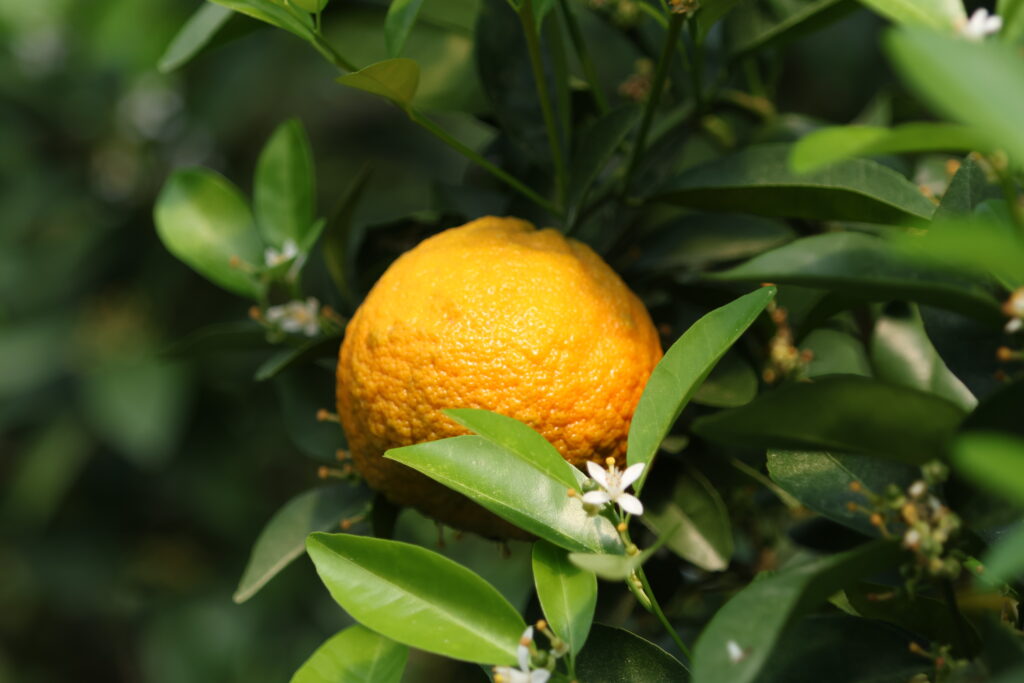
Jose Flores, a worried Athens resident, said climate change has changed the timing of when people are planting and seasons itself.
“If you plant out of season or you are too late in planting in the season you might not yield as much as you wanted to,” he said. “Which then hits our pockets because of supply and demand”.
